|
|
|
Sort Order |
|
|
|
Items / Page
|
|
|
|
|
|
|
| Srl | Item |
| 1 |
ID:
127660
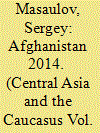

|
|
|
|
|
| Publication |
2013.
|
| Summary/Abstract |
The continuing destabilization of public life in Afghanistan and far from always successful attempts by the International Security Assistance Force (ISAF) to return it to normal are creating fundamental challenges and threats to regional and global security.
The following problems can be identified:
1. Higher drug production and circulation. This is causing a steady rise in both the number of people dependent on heroin and opiates coming from Afghanistan and the total number of drug addicts (according to experts, 36,000 young people die from drugs in Russia every year).
2. Stronger transnational crime groups in Central Asia (CA). Their activity is closely related to the drug business and movement of drugs from Afghanistan to Russia and Europe through the Central Asian countries.
3. Continued presence of armed U.S. and NATO forces in Afghanistan and its neighboring states in the form of their network of super bases is not helping to combat the threat of terrorism.
In recent years, it has become obvious that the CA states are facing a complex problem manifested in a dramatic deterioration of the internal situation in Afghanistan and Pakistan; an increase in the fragmentary Talibanization factor; similar situations in the border areas of Afghanistan and Pakistan; and an aggravation of the Pashtun issue.
The problem is that some of the former ideas about what is going on in Afghanistan do not correspond to current reality. It is incorrect to take the simplified approach and reduce the entire problem to the existence of the Taliban movement, under which all those drawn into the struggle against the ISAF in the wake of various ideas and slogans are lumped. Several Taliban centers function in Afghanistan and Pakistan (radical, extremist, and moderate).
The policy of the CA states should not be limited to endowing the large nations with the right to resolve the Afghan-Pakistani problems. States with interests in the country that are capable of having an impact on the development of the situation must also be engaged to untie the "Afghan knot"; the matter primarily concerns Russia, China, Iran, and the CA countries.
|
|
|
|
|
|
|
|
|
|
|
|
|
|
|
|
| 2 |
ID:
127659
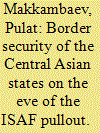

|
|
|
|
|
| Publication |
2013.
|
| Summary/Abstract |
For over 30 years now, the conflict in Afghanistan has been and remains a source of international and regional instability. The crisis developments emerging in the territory of this country threaten the border security of the Central Asian states; what will happen in Afghanistan after the ISAF pullout is causing even more concern.
The author analyzes the impact of the Afghan conflict on the border security of the Central Asian states and concludes that bilateral and multilateral efforts to preserve border security should be improved to stave off the threats that might emanate from Afghanistan.
|
|
|
|
|
|
|
|
|
|
|
|
|
|
|
|
| 3 |
ID:
127652
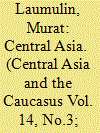

|
|
|
|
|
| Publication |
2013.
|
| Summary/Abstract |
Its geographic location, domestic political complications, ethno-confessional diversity, and involvement in the global shadow economy keep Afghanistan in the center of the intertwining interests of state and extra-state forces. This threatens the country's immediate neighbors and even whole regions and explains the never weakening interest of Pakistan, India, Iran, the Central Asian Soviet successor-states, China, and Russia in what is going on in this country.
|
|
|
|
|
|
|
|
|
|
|
|
|
|
|
|
| 4 |
ID:
127668


|
|
|
|
|
| Publication |
2013.
|
| Summary/Abstract |
During its twenty years of independence, the dynamics of Tajikistan's trade and economic relations with Russia and China have undergone dramatic changes. Russia's share is gradually declining, while China's is growing; imports noticeably outstrip exports in Tajikistan's goods turnover with these countries. The import and export commodity structures also greatly differ. Both Russia and China have their own areas of specialization in the economy and are pursuing a policy aimed at establishing unequal relations with Tajikistan.
|
|
|
|
|
|
|
|
|
|
|
|
|
|
|
|
| 5 |
ID:
127667
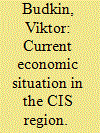

|
|
|
|
|
| Publication |
2013.
|
| Summary/Abstract |
This article examines the specific manifestations of crisis phenomena in the region of the Commonwealth of Independent States (CIS) that are most pronounced in countries making progress in the creation of a market economy. The author emphasizes the imitative nature of economic reforms in the post-Soviet space. Based on an analysis of international assessments of the current economic situation in these states, he identifies the main factors that prevent their transition from extensive to intensive economic activity. He stresses the objective nature of the lack of internal prerequisites for a transition to large-scale modernization of the economy and innovative economic development. His conclusion is that the CIS countries (or "newly independent states" in foreign terminology) may face high-level threats to national security with the onset of the next stage of the recession in the absence of reliable prerequisites for economic stabilization in these countries.
|
|
|
|
|
|
|
|
|
|
|
|
|
|
|
|
| 6 |
ID:
127669
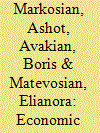

|
|
|
|
|
| Publication |
2013.
|
| Summary/Abstract |
This article takes a look at the current state and dynamics of Armenia's economy over the past few years; the authors have studied several budget expenditure items, and also carried out a comparative analysis of Armenia's external trade indices with the countries of the region.
Involvement in any conflict, particularly one that is unresolved, has an impact on the country's economy and makes it unattractive to investors, who do not like vagueness and avoid risks; commerce strives to minimize transactional outlays, while closed borders lead to enclave development. This is precisely how Armenia's economy has been developing over the past two decades.
This situation is making the country's economy dependent on particular players, different factors, and so on, and is leading to monopolization of its main branches and underdevelopment of sectors that in other conditions could become a catalyst for economic progress.
An analysis of the economic growth trends in the Republic of Armenia (RA) shows that this growth is still having little influence on the standard of living of the country's population, since government budget expenditures are mainly oriented toward defense. At the same time, the main source of personal monetary income comes from private remittances.
Investment flows and Armenia's reciprocal trade with neighboring countries are going against the overall economic integration trends. This is causing countries that are already in a state of conflict to move increasingly away from each other.
The authors of this article think that economic cooperation among all the countries of the Southern Caucasus should become an alternative to the continuing conflict.
|
|
|
|
|
|
|
|
|
|
|
|
|
|
|
|
| 7 |
ID:
127673
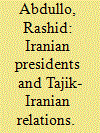

|
|
|
|
|
| Publication |
2013.
|
| Summary/Abstract |
The author examines the relations between the two countries in the context of the political processes going on in Iran. Throughout the twenty years of Tajikistan's independence, these relations have passed through different stages, each of them marked by Tehran's political course and the personalities of each of the Iranian presidents. At the early stages, flexible and cautious Rafsanjani preferred to limit contacts to cultural cooperation; Tehran, however, did not shun involvement in the domestic conflict in Tajikistan as a broker; its positive contribution cannot be overestimated. This was when the two countries set up a base for closer trade and economic contacts; they encouraged business trips and tourism in an effort to become better acquainted with each other. Under President Khatami bilateral relations acquired an even stronger economic bias. Iranian investments helped to implement several large-scale strategic infrastructural projects initiated by the government of Tajikistan. It was during the presidency of Mahmoud Ahmadinejad that relations between the two countries reached a new and higher level: Iran became a strategic partner and the largest investor. Tehran invested in strategically important projects in energy, transport, and communication. Recently elected President Hassan Rouhani, known as subtle politician and diplomat, will probably change the development vector of relations between the two countries.
|
|
|
|
|
|
|
|
|
|
|
|
|
|
|
|
| 8 |
ID:
127664


|
|
|
|
|
| Publication |
2013.
|
| Summary/Abstract |
This article analyzes the state of Iranian-Afghan relations on the threshold of the withdrawal of the main contingent of American troops from Afghanistan planned for 2014 in the context of the current geopolitical processes going on in Central Asia. It examines the similarities and differences in the strivings of the various actors, the situation in Afghanistan that has arisen as a result of their clash, as well as the regional threats and challenges to Iran's interests. It points to the geopolitical contradictions among regional players, primarily between the U.S. and Iran, as the main variable influencing the situation in Afghanistan and its relations with Iran. According to the author, these geopolitical contradictions and the challenges and threats to regional stability ensuing from them are creating political and economic problems that are complicating the development of Iranian-Afghan relations. This is making rehabilitation of Afghanistan more difficult, including in the vitally important economic sphere, resulting in destabilization of the situation within the country and around it.
|
|
|
|
|
|
|
|
|
|
|
|
|
|
|
|
| 9 |
ID:
127663
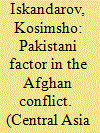

|
|
|
|
|
| Publication |
2013.
|
| Summary/Abstract |
In 1947, when Pakistan was established as an independent country, Afghanistan ceased to recognize the Durand Line, the border between India and Afghanistan drawn in 1893 under an agreement between Foreign Secretary of British India Sir Mortimer Durand and Afghan Amir Abdur Rahman Khan, and raised the question of the Pashtuns who found themselves in the newly established state. The Afghans demanded that the British either grant the Pashtuns and Balochi the right to elect their own government independent from the center or to join Afghanistan: as Afghans they should be free to decide whether they wanted to belong to any state or would prefer independence; deep at heart, however, the Afghan rulers expected that the British withdrawal from India would render the Durand Line agreement null and void. The relations between Afghanistan and Pakistan are burdened by countless problems; this explains why Pakistan keeps on interfering in its neighbor's domestic affairs.
|
|
|
|
|
|
|
|
|
|
|
|
|
|
|
|
| 10 |
ID:
127662
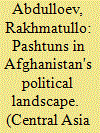

|
|
|
|
|
| Publication |
2013.
|
| Summary/Abstract |
For the past fifty years, academics and politicians have been discussing the problem of Pashtun domination in the political life and state structures of Afghanistan. From the very beginning (the Afghan state appeared in 1747), supreme power belonged to members of several Pashtun clans, not counting the two brief periods when ethnic Tajiks filled the highest post: Habibullah Khan Kalakani in 1929 and Burhanuddin Rabbani in 1992-2002.
Until 1973, when Afghanistan ceased to be a monarchy, members of the Pashtun political elite ruled the country as emirs and kings; Pashtuns resided at the very top of the pyramid of power. They owed their exalted position to the prevailing opinion that Pashtuns created the state of Ahmad Shah Durrani.
This is true: the main Pashtun tribal groups and unions set up the Afghan state and remained the pillar of its rulers; their fighting force and military skills were the main factors that added strength to the power of the emir (king) and the key elements of the armed forces of Afghanistan.
|
|
|
|
|
|
|
|
|
|
|
|
|
|
|
|
| 11 |
ID:
127653
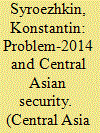

|
|
|
|
|
| Publication |
2013.
|
| Summary/Abstract |
The author analyzes the outcome of the 12 years of the counterterrorist operation in Afghanistan and the problems it has created. He looks at some of the political aspects related to the 2014 pullout and the main threats and challenges to regional security emanating from Afghanistan.
The external threats to regional security, their potential exacerbation because of the coalition withdrawal, and their potential localization are likewise analyzed.
He also examines the SCO's possible involvement in settling the Afghan problem and the fields and spheres in which this organization could apply its potential.
|
|
|
|
|
|
|
|
|
|
|
|
|
|
|
|
| 12 |
ID:
127658


|
|
|
|
|
| Publication |
2013.
|
| Summary/Abstract |
While a military solution in Afghanistan has failed, the search for a political solution that includes the insurgent Taliban movement has not yielded any significant results, despite initial U.S.-Taliban contacts in Qatar in 2011 and 2012 originally facilitated by Germany. All contacts with the Taliban so far have been preliminary and exploratory and have not yet reached the "negotiations" stage. No substantial progress has been made so far in 2013 either. There are several other obstacles hindering the start of constructive negotiations, mainly: the U.S. approach that often sidelines the Afghan government, the Taliban's refusal to talk to the Afghan government and the Afghan government's lack of a clear strategy for such negotiations, as well as the general mistrust between the potential parties in the negotiations and the failure of all sides to recognize that talks with the Taliban constitute only one element of a political solution. After a period of extremely strained relations with Pakistan, the Afghan government is hoping for Pakistan's support to open a direct channel to the Taliban leadership, a demand formulated before President Karzai's August 2013 visit to Pakistan.
The current attempts of the Afghan and Pakistani governments to relocate, and in fact dismantle, the Taliban liaison office have, however, created an additional hurdle that will make substantial negotiations even less likely in the short term. The Taliban have already made it known that they do not want Pakistan and Saudi Arabia-both countries suggested by Kabul as a possible new location for the Taliban liaison office-to play a central role. A genuine political solution requires inclusiveness. As a first prerequisite to achieve this, the well-founded reservations of large sectors of Afghan civil society, including the organized women's movement, many young Afghans, and much of the political opposition against any talks with the Taliban and their future role in Afghan politics need to be taken seriously. Their most valid concern is that their own government and its international allies, who have already set the date for the "handover" and withdrawal from Afghanistan, might go for a quick political power-sharing deal between the Karzai government and the Taliban, thereby adding just one more armed faction to the conflict and not addressing the root causes of the conflicts in Afghanistan, of which insurgency is only one.
|
|
|
|
|
|
|
|
|
|
|
|
|
|
|
|
| 13 |
ID:
127665
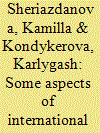

|
|
|
|
|
| Publication |
2013.
|
| Summary/Abstract |
The SCO has become an influential international structure today. Throughout its existence, the Organization has acted as an important mechanism for ensuring regional stability, as well as sustainable political and economic cooperation in the area in which it operates. Today the SCO is playing an increasingly efficient part in building the global security system, which is largely due to the new threats and challenges the world community now faces.
Kazakhstan's chairmanship in the SCO ended with a celebratory sitting of the Council of Heads of Member States held on 15 June, 2011 in Astana. At this meeting, the Astana declaration of the SCO's Tenth Anniversary was adopted, which states that during this time, the Organization has successfully advanced from its institutionalization to the establishment of efficiently functioning mechanisms of interaction in different spheres.
The SCO is a regional international organization, the main tasks of which are strengthening stability and security in the broad area that joins the states belonging to it, fighting terrorism, separatism, extremism, and drug trafficking, developing economic cooperation and energy partnership, and enhancing scientific and cultural interaction.
The SCO is an essentially new model of geopolitical integration that makes it possible to unite the interests of Central Asia, Russia, and China. This statement is based on the experience of the SCO member states that are pooling their efforts to oppose non-traditional threats to security in Central Asia-terrorism, flagrant fundamentalism, drug crimes, and separatism.
Of course, there are political reasons for unifying the countries within the SCO borne by the desire to ensure security in the region, while economic factors predominate in the traditional integration models. In this case, free trade is the springboard for forming a political union.
However, despite the prime importance of the political component in the SCO's activity, it is the economic factors that make it possible to oppose the negative trends in the life of the Central Asian region.
|
|
|
|
|
|
|
|
|
|
|
|
|
|
|
|
| 14 |
ID:
127655


|
|
|
|
|
| Publication |
2013.
|
| Summary/Abstract |
The United States attacked Afghanistan in October 2001, beginning the longest war in American history. Ten years later, on 22 June, 2011, Barack Obama announced that the United States would pull American troops out of Afghanistan. While there is a failed government with instability in Afghanistan, the Taliban will remain powerful, carrying out criminal actions against the Afghan people and coalition forces.
After withdrawal of the American troops, Afghanistan will pose both challenges and opportunities in the region, but this will depend on America's crisis management in the region. This article analyzes the new situation in Afghanistan after the withdrawal of U.S. troops and the impact the New Obama Strategy will have on Afghanistan's national security.
This research adopts a descriptive-analytic approach. It uses books and scholarly articles published in different scientific journals, as well as interviews from government sources and official news agencies.
|
|
|
|
|
|
|
|
|
|
|
|
|
|
|
|
| 15 |
ID:
127671


|
|
|
|
|
| Publication |
2013.
|
| Summary/Abstract |
Contrary to the widespread opinion, Central Asia is not a homogenous region made up of independent countries that can easily be lumped together. It is not a monolith, but a territory crisscrossed by numerous dividing lines, some of them created by different, or even opposing, foreign policy preferences of the Central Asian republics. The author has taken two of them-Turkmenistan and Uzbekistan-to demonstrate the main trends of multivectoral foreign policy pursued by the regional actors, irrespective of how relations with the external players are developing.
|
|
|
|
|
|
|
|
|
|
|
|
|
|
|
|
|
|
|
|
|